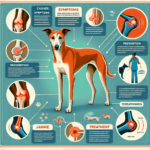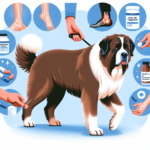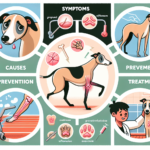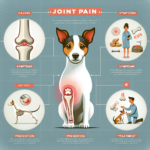Sloughi Joint Pain: Causes, Symptoms, Prevention, and Treatment
Introduction
The Sloughi, also known as the Arabian Greyhound, is a breed of sighthound that hails from North Africa. Known for its elegance, speed, and endurance, the Sloughi has been a cherished companion and hunting dog for centuries. This breed is characterized by its lean, muscular build, short coat, and keen eyesight. Sloughis are known for their loyalty, intelligence, and gentle nature, making them excellent family pets as well as skilled hunters.
Like many purebred dogs, Sloughis are prone to certain health issues, with joint pain being a significant concern. Joint health is crucial for maintaining the breed’s agility and overall quality of life. Understanding the causes, symptoms, prevention, and treatment of joint pain in Sloughis is essential for owners who wish to ensure their pets lead healthy, active lives.
Breed-Specific Joint Pain Risks
Genetic Predisposition
Sloughis, like many other sighthounds, are genetically predisposed to certain joint-related issues. Hip dysplasia, a condition where the hip joint does not fit properly into the hip socket, is a common concern. This can lead to arthritis and significant pain over time. Elbow dysplasia, another genetic condition, affects the elbow joint and can cause similar issues. Both conditions are hereditary, meaning that responsible breeding practices are crucial for reducing their prevalence.
Age-Related Risks
As Sloughis age, they become more susceptible to joint pain and related conditions. While younger dogs may show few signs of joint issues, older Sloughis often develop arthritis, a degenerative joint disease that causes inflammation and pain. Owners should be particularly vigilant as their Sloughi approaches middle age, typically around 6-8 years, to catch early signs of joint deterioration.
Activity Level and Joint Stress
Sloughis are highly active dogs that require regular exercise to maintain their physical and mental health. However, their high activity levels can also contribute to joint stress, especially if they engage in high-impact activities like running or jumping. While exercise is essential, it must be balanced to avoid overexertion and subsequent joint damage.
Common Symptoms of Joint Pain in Sloughis
General Symptoms
Owners should be aware of several common symptoms that may indicate joint pain in their Sloughi:
- Limping or favoring one leg
- Stiffness, especially after rest
- Reluctance to move or climb stairs
- Decreased activity or playfulness
- Visible discomfort or pain when touched
- Swelling around the joints
Breed-Specific Symptoms
While the general symptoms of joint pain are similar across breeds, Sloughis may exhibit some breed-specific signs. Due to their lean build, any changes in gait or posture can be more noticeable. Additionally, Sloughis may become more reserved or less interactive when experiencing joint pain, as their natural inclination is to hide discomfort.
When to Consult a Vet
If you notice any of the above symptoms in your Sloughi, it is crucial to consult a veterinarian promptly. Early diagnosis and treatment can significantly improve the quality of life for dogs suffering from joint pain. Regular veterinary check-ups are also essential for monitoring joint health and catching any issues early.
Preventive Measures for Joint Health
Exercise Recommendations
Maintaining an appropriate exercise routine is vital for Sloughis. Low-impact activities such as walking, swimming, and controlled play can help keep their joints healthy without causing excessive stress. Avoid high-impact activities like jumping or running on hard surfaces, which can exacerbate joint issues.
Dietary Suggestions
A balanced diet rich in essential nutrients can support joint health. Foods containing glucosamine, chondroitin, and omega-3 fatty acids are particularly beneficial. These nutrients help maintain cartilage health and reduce inflammation. Consult your veterinarian for specific dietary recommendations and consider supplements if necessary.
Weight Management
Maintaining a healthy weight is crucial for reducing joint stress. Overweight dogs are more prone to joint issues due to the additional strain on their joints. Monitor your Sloughi’s weight and adjust their diet and exercise routine as needed to keep them at an optimal weight.
Early Screening and Monitoring
Regular veterinary check-ups and early screening for joint issues can help catch problems before they become severe. X-rays and other diagnostic tools can identify conditions like hip or elbow dysplasia early on, allowing for timely intervention. Genetic testing can also help identify dogs at risk, guiding breeding decisions to reduce the prevalence of these conditions.
Treatment Options for Joint Pain
Non-Surgical Treatments
Several non-surgical treatment options can help manage joint pain in Sloughis:
- Medications: Anti-inflammatory drugs and pain relievers can help manage pain and reduce inflammation.
- Physical Therapy: Exercises and therapies designed to strengthen muscles and improve joint function can be beneficial.
- Lifestyle Adjustments: Modifying your dog’s activity level and providing a comfortable living environment can help alleviate pain.
Surgical Options
In severe cases, surgical intervention may be necessary. Common surgical options include:
- Hip Replacement: Replacing the damaged hip joint with an artificial one can significantly improve mobility and reduce pain.
- Arthroscopy: A minimally invasive procedure to clean out the joint and remove damaged tissue.
- Joint Fusion: Fusing the joint to eliminate pain, though this reduces mobility.
Consult your veterinarian to determine the best surgical option for your Sloughi.
Alternative Therapies
Alternative treatments can also provide relief for joint pain:
- Acupuncture: This ancient practice can help reduce pain and improve joint function.
- Hydrotherapy: Water-based exercises can strengthen muscles without putting stress on the joints.
- Massage: Regular massages can help alleviate pain and improve circulation.
Lifestyle and Management Tips
Daily Care Routine
A consistent daily care routine can help manage joint pain in Sloughis. This may include:
- Regular, low-impact exercise
- A balanced diet with joint-supporting nutrients
- Administering medications or supplements as prescribed
- Regular veterinary check-ups
Modifying the Home Environment
Making your home more comfortable for a dog with joint pain can significantly improve their quality of life. Consider the following modifications:
- Installing ramps to avoid stairs
- Providing orthopedic beds for better support
- Using non-slip mats to prevent falls
- Ensuring easy access to food, water, and favorite resting spots
Long-Term Management
Long-term management of joint pain involves a combination of regular veterinary care, appropriate exercise, a balanced diet, and a comfortable living environment. Consistency is key to keeping your Sloughi active and happy despite joint pain.
FAQs About Sloughis and Joint Pain
What are the early signs of joint pain in Sloughis?
Early signs include limping, stiffness, reluctance to move, and decreased activity levels. If you notice any of these symptoms, consult your veterinarian.
Can joint pain in Sloughis be prevented?
While genetic predispositions cannot be entirely prevented, maintaining a healthy weight, providing a balanced diet, and ensuring regular, low-impact exercise can help reduce the risk of joint pain.
Are there specific foods that can help with joint health?
Yes, foods rich in glucosamine, chondroitin, and omega-3 fatty acids can support joint health. Consult your veterinarian for specific dietary recommendations.
When should I consider surgery for my Sloughi’s joint pain?
Surgery should be considered when non-surgical treatments are no longer effective, and your dog’s quality of life is significantly impacted. Consult your veterinarian to discuss the best options.
Conclusion
Joint pain is a significant concern for Sloughis, but with proper care and attention, it can be managed effectively. By understanding the causes, symptoms, prevention, and treatment options, owners can ensure their Sloughis lead healthy, active lives. Regular veterinary check-ups, a balanced diet, appropriate exercise, and a comfortable living environment are crucial for maintaining joint health. Taking preventive measures and consulting your veterinarian regularly will help keep your Sloughi happy and pain-free.




